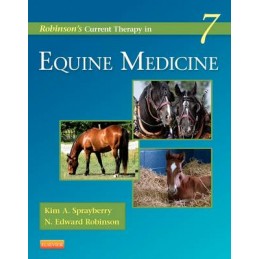- Reduced price

Order to parcel locker

easy pay


 Delivery policy
Delivery policy
Choose Paczkomat Inpost, Orlen Paczka, DHL, DPD or Poczta Polska. Click for more details
 Security policy
Security policy
Pay with a quick bank transfer, payment card or cash on delivery. Click for more details
 Return policy
Return policy
If you are a consumer, you can return the goods within 14 days. Click for more details
With coverage of current issues and the latest therapeutic advances, Robinsons Current Therapy in Equine Medicine, Volume 7 provides a concise, all-new reference for the management of equine disorders and conditions. Chapters emphasize the practical aspects of diagnosis and treatment and provide details for therapeutic regimens. This new volume brings you thorough coverage and authoritative advice on selected topics in areas that have seen significant advances in the last five years. Cutting-edge topics include emerging and exotic infectious diseases that may endanger horses in North America; biosecurity strategies; imaging updates; medical genetics; multimodal pain management; and regenerative, geriatric, and oncologic medicine. A logical body-system organization will save you time in finding the information you need. From well-known editors Kim Sprayberry and N. Edward Robinson, with chapters written by nearly 200 equine experts, this invaluable reference provides unparalleled guidance on the latest issues in equine medicine.
Data sheet
